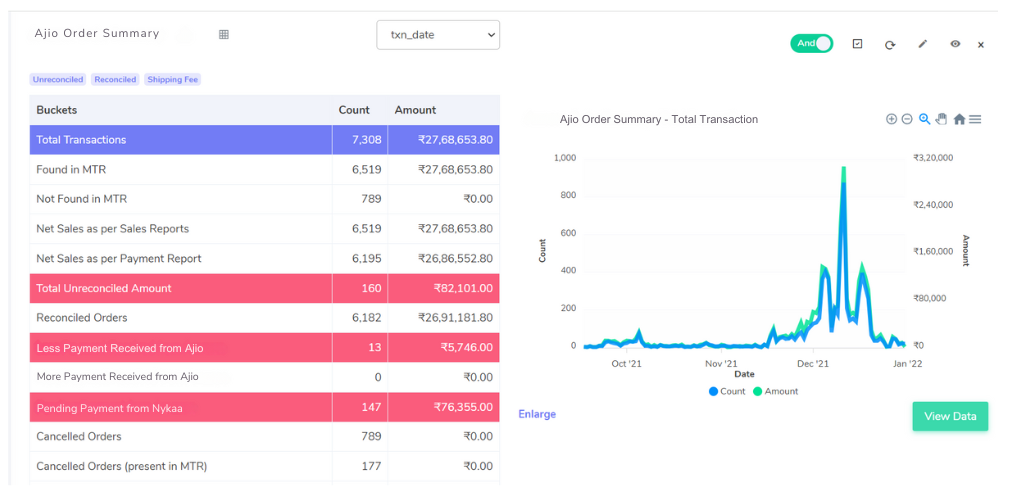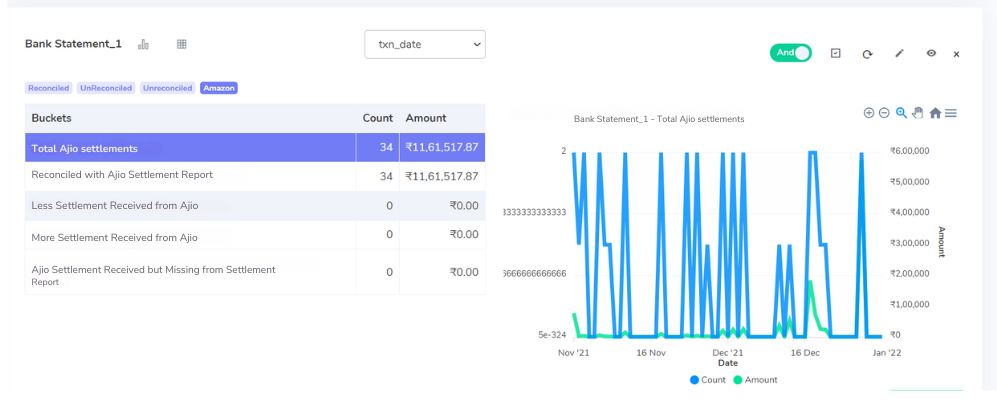

AJIO is poised to revolutionize the Indian fashion e-commerce landscape. This brand, backed by Reliance Retail’s extensive physical infrastructure and Jio’s cutting-edge internet technology, is crafting a unique strategy specifically tailored for the Indian market. AJIO’s vision centers around the seamless integration of online and offline retail experiences, along with pioneering advancements in delivery services, payment ecosystems, and overall customer experience. For sellers, partnering with AJIO’s marketplace presents a phenomenal opportunity to achieve exponential growth through a powerful online presence within the thriving Indian fashion market.
Managing finances as an Ajio seller can be a complex task. With Ajio collecting payments for dispatched goods and reimbursing sellers later, keeping track of vast quantities of transactions and intricate details like item prices and received payments can be a time-consuming nightmare.
Cointab’s automated reconciliation system offers a powerful solution, specifically designed to address the challenges faced by Ajio sellers.
This innovative system eliminates the tedious manual processes of reconciliation and verification. Cointab’s user-friendly platform features an automated data uploading feature, streamlining information intake and saving sellers valuable time. Furthermore, the system generates clear and concise results, allowing sellers to effortlessly analyze their financial data.
Essential Reports for Successful Reconciliation:
A comprehensive set of reports underpins successful reconciliation. Here’s a breakdown of the crucial Ajio reports needed:
Ajio GST Report: This report provides a detailed record of every order, including the corresponding Goods and Services Tax (GST) rates and charges levied. It ensures sellers have a clear understanding of the tax implications associated with each transaction on the Ajio platform.
Ajio Order Report: This foundational report offers a complete record of all transactions between the seller and Ajio. It encompasses vital details such as order IDs, product information, quantities purchased, and order values. This report serves as the backbone for comparing order details across different reports.
Ajio Payment Report: Successful order fulfillment culminates in timely payouts to sellers. The Ajio Payment Report plays a critical role in reconciliation by recording all payments made for each order. This report includes details like the final amount paid, transaction fees incurred (if any), and a reference number for easy bank reconciliation.
Ajio Return Report: In the event of order returns or cancellations, the Ajio Return Report provides critical details for each affected order. This report enables sellers to track returned items, manage refunds, and ensure accurate financial reconciliation.
Payment Reconciliation: Tracking Ajio payments, received days after order delivery, can be overwhelming due to the high daily transaction volume. This crucial process, essential for identifying potential financial losses, becomes effortless with Cointab’s system. It automatically analyses various reports, generating a clear and concise summary that includes all order details, charges, and received payments. This user-friendly format simplifies analysis for sellers, allowing them to focus on their business growth.
Result

The initial stage of reconciliation focuses on comparing order details and received payments. Here’s what the results unveil:
Reconciled with Order Summary: This category signifies transactions where the total order value perfectly aligns with the corresponding payment amount. These transactions reflect accurate data synchronization between order details and received payments.
Less Payment Received: Discrepancies highlighted here indicate instances where the payment amount recorded in the payment report falls short of the order total reflected in the order summary. This could potentially signify underpayments by Ajio, deductions for returns/cancellations, or other discrepancies requiring investigation.
More Payment Received: Conversely, this category showcases transactions where the payment report reflects a higher amount compared to the order summary. This might be due to additional charges levied by Ajio (e.g., platform fees) not initially included in the order total.
Not Found in Payment Report: Orders recorded within the order report but absent from the payment report are listed here. This could signify missing entries within Ajio’s payment system or potential order processing errors.
Bank Reconciliation

Following payment reconciliation, Cointab’s technology delves deeper with an additional crucial step – bank reconciliation. This process verifies that payments received from Ajio are accurately reflected in the seller’s bank account.
Reconciled with Ajio Settlement Report: Transactions highlighted here represent instances where the amount deposited in the seller’s bank account precisely matches the settlement amount guaranteed by Ajio. This signifies a successful and complete financial transaction.
Less Payment in Bank: This category denotes discrepancies where the bank credit falls short of the settlement amount reported by Ajio. This could indicate missing deposits, bank processing errors, or potential discrepancies requiring investigation with Ajio.
More Payment in Bank: This category showcases transactions where the bank deposit exceeds the settlement amount reported by Ajio. This might be due to additional payments received or potential bank account errors requiring further analysis.
Not Found in Settlement Report: These transactions represent deposits received in the seller’s bank account that are not reflected in Ajio’s settlement report. This could signify duplicate payments from Ajio, bank processing errors, or other inconsistencies requiring investigation.
Ajio sellers can forgo manual recordkeeping thanks to Cointab’s automated reconciliation system. The system’s intuitive results effortlessly differentiate between reconciled transactions, underpayments, and discrepancies. This newfound clarity empowers sellers to swiftly pinpoint errors, collaborate with Ajio for rectification, and ensure the accuracy of their financial data.